- Clone
- TUGm2 (See other available formats)
- Regulatory Status
- RUO
- Other Names
- Common γ chain, γc, IL-2 receptor γ subunit
- Isotype
- Rat IgG2b, κ
- Ave. Rating
- Submit a Review
- Product Citations
- publications
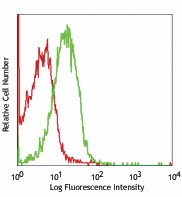
-

C57BL/6 splenocytes stained with TUGm2 PE
| Cat # | Size | Price | Quantity Check Availability | Save | ||
|---|---|---|---|---|---|---|
| 132305 | 50 µg | 146 CHF | ||||
| 132306 | 200 µg | 365 CHF | ||||
CD132 is a 64-70 kD type I transmembrane glycoprotein of the Ig superfamily, and is also known as common γ chain (γc) or IL-2 receptor γ subunit. It is expressed broadly on T- and B-lymphocytes, NK cells, monocytes, and granulocytes. CD132 is an essential component of cytokine receptors for IL-2, IL-4, IL-7, IL-9, IL-15, and IL-21. Ligand binding induces tyrosine phosphorylation and initiates signaling through a JAK/STAT pathway. CD132 mutation results in X-linked severe combined immune deficiency (XSCID).
Product DetailsProduct Details
- Verified Reactivity
- Mouse
- Antibody Type
- Monoclonal
- Host Species
- Rat
- Formulation
- Phosphate-buffered solution, pH 7.2, containing 0.09% sodium azide.
- Preparation
- The antibody was purified by affinity chromatography, and conjugated with PE under optimal conditions.
- Concentration
- 0.2 mg/ml
- Storage & Handling
- The antibody solution should be stored undiluted between 2°C and 8°C, and protected from prolonged exposure to light. Do not freeze.
- Application
-
FC - Quality tested
- Recommended Usage
-
Each lot of this antibody is quality control tested by immunofluorescent staining with flow cytometric analysis. For flow cytometric staining, the suggested use of this reagent is ≤ 1.0 µg per 106 cells in 100 µl volume It is recommended that the reagent be titrated for optimal performance for each application.
- Excitation Laser
-
Blue Laser (488 nm)
Green Laser (532 nm)/Yellow-Green Laser (561 nm)
-
Application References
(PubMed link indicates BioLegend citation) - Product Citations
-
- RRID
-
AB_2123703 (BioLegend Cat. No. 132305)
AB_2280163 (BioLegend Cat. No. 132306)
Antigen Details
- Structure
- Type I transmembrane glycoprotein, Ig superfamily 64-70 kD
- Distribution
-
T cells, B cells, NK, monocytes, granulocytes
- Function
- Signaling
- Ligand/Receptor
- Component of cytokine receptors for IL-2, IL-4, IL-7, IL-9, IL-15 and IL-21
- Cell Type
- B cells, Granulocytes, Monocytes, NK cells, T cells
- Biology Area
- Immunology
- Molecular Family
- CD Molecules, Cytokine/Chemokine Receptors
- Antigen References
-
1. Itano M, et al. 1996. Tohoku J. Exp. Med. 178:389
2. Zola H, et al. eds. 2007. Leukocyte and Stromal Cell Molecules:The CD Markers. Wiely-Liss A John Wiley & Sons Inc, Publication
3. Nakarai T, et al. 1994. J. Exp. Med. 180:241
4. Kawahara A, et al. 1995. Proc. Natl. Acad. Sci. USA. 92:8724
5. Habib T, et al. 2002. Biochemistry. 41:8725
6. Matthews DJ, et al. 1995. Blood 85:38 - Gene ID
- 16186 View all products for this Gene ID
- UniProt
- View information about CD132 on UniProt.org
Related FAQs
- What type of PE do you use in your conjugates?
- We use R-PE in our conjugates.
Other Formats
View All CD132 Reagents Request Custom Conjugation| Description | Clone | Applications |
|---|---|---|
| PE anti-mouse CD132 (common γ chain) | TUGm2 | FC |
| APC anti-mouse CD132 (common γ chain) | TUGm2 | FC |
| PE/Cyanine7 anti-mouse CD132 (common γ chain) | TUGm2 | FC |
Customers Also Purchased
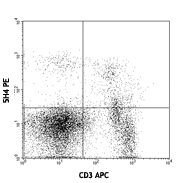
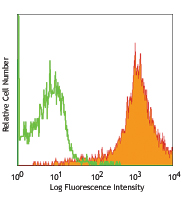
Compare Data Across All Formats
This data display is provided for general comparisons between formats.
Your actual data may vary due to variations in samples, target cells, instruments and their settings, staining conditions, and other factors.
If you need assistance with selecting the best format contact our expert technical support team.
-
PE anti-mouse CD132 (common γ chain)
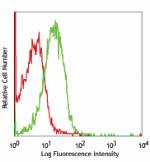
C57BL/6 splenocytes stained with TUGm2 PE -
APC anti-mouse CD132 (common γ chain)
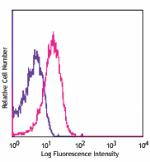
C57BL/6 splenocytes stained with TUGM2 APC -
PE/Cyanine7 anti-mouse CD132 (common γ chain)
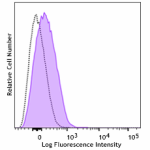
C57BL/6 splenocytes were stained with anti-mouse CD132 (comm...
 Login / Register
Login / Register 










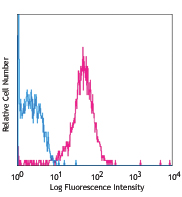
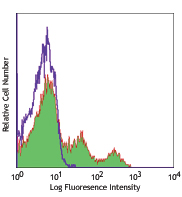



Follow Us